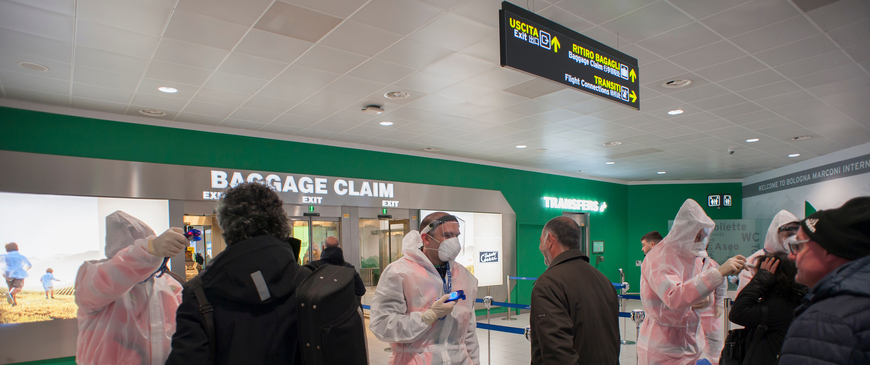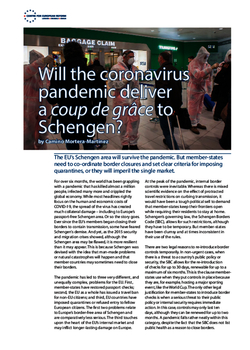
Will the coronavirus pandemic deliver a coup de grâce to Schengen?
The EU’s Schengen area will survive the pandemic. But member-states need to co-ordinate border closures and set clear criteria for imposing quarantines, or they will imperil the single market.
For over six months, the world has been grappling with a pandemic that has killed almost a million people, infected many more and crippled the global economy. While most headlines rightly focus on the human and economic costs of COVID-19, the spread of the virus has created much collateral damage – including to Europe’s passport-free Schengen area. Or so the story goes. Ever since the EU’s members began closing their borders to contain transmission, some have feared Schengen’s demise. And yet, as the 2015 security and migration crises showed, although the Schengen area may be flawed, it is more resilient than it may appear. This is because Schengen was devised with the idea that man-made problems or natural catastrophes will happen and that member countries may sometimes need to close their borders.
The Schengen area is more resilient than it may appear. This is because it was devised with the idea that man-made problems or natural catastrophes will happen and that member countries may sometimes need to close their borders.
The pandemic has led to three very different, and unequally complex, problems for the EU. First, member-states have restored passport checks; second, the EU as a whole has issued a travel ban for non-EU citizens; and third, EU countries have imposed quarantines or refused entry to fellow European citizens. The first two problems relate to Europe’s border-free area of Schengen and are comparatively less serious. The third touches upon the heart of the EU’s internal market and may inflict longer-lasting damage on Europe.
At the peak of the pandemic, internal border controls were inevitable. Whereas there is mixed scientific evidence on the effect of protracted travel restrictions on curbing transmission, it would have been a tough political sell to demand that member-states keep their frontiers open while requiring their residents to stay at home. Schengen’s governing law, the Schengen Borders Code (SBC), allows for such restrictions, although they have to be temporary. But member-states have been clumsy and at times inconsistent in their use of the rules.
There are two legal reasons to re-introduce border controls temporarily. In non-urgent cases, when there is a threat to a country’s public policy or security, the SBC allows for the re-introduction of checks for up to 30 days, renewable for up to a maximum of six months. This is the clause member-states use when they put controls in place because they are, for example, hosting a major sporting event, like the World Cup. The only other legal justification for member-states to introduce border checks is when a serious threat to their public policy or internal security requires immediate action. In this case, controls may only last ten days, although they can be renewed for up to two months. A pandemic falls rather neatly within this category, despite the fact that the SBC does not list public health as a reason to close borders.
And yet countries like Denmark and Finland decided to invoke the non-urgent clause, presumably because it allowed them to set border checks for longer. France has simply extended checks already in place since the 2015 Paris terrorist attacks. Other countries did not bother notifying the Commission at all (a legal obligation under the SBC). At the time of writing, eight member-states still have border controls in place. All countries have exceeded the deadline for when they had to end border checks; many had no legal justification to begin with.
Because there is no central Schengen authority with direct enforcement competences, the Commission has very little power to ensure Schengen countries comply with the law. It can bring them to court, which it has understandably not done in the midst of the pandemic. But closing and opening borders seemingly at random creates uncertainty for citizens and business. Schengen countries do not always notify their neighbours about new border checks, and they sometimes evoke non-COVID-19 related risks to keep their borders shut. The EU needs to streamline internal border controls, if they are needed to contain second or third waves of COVID-19. For that, the Commission should make sure countries co-ordinate their border closures with one another, as per a recent Franco-German initiative, which focuses on facilitating regular contact between border authorities.
The EU needs to streamline internal border controls, if they are needed to contain second or third waves of COVID-19.
If the European Commission has been unable, or unwilling, to call member countries to order, it may be because it is finding it difficult to navigate coronavirus politics. Only four days after criticising Donald Trump for imposing a travel ban on Schengen countries, the Commission “invited” member-states to stop non-European citizens who do not permanently reside in the EU from entering the Schengen area. The Commission has no competences to shut access to the Schengen area. Nor has it ever asked member-states to close the bloc’s external borders. The SBC allows member countries to deny entry to non-European citizens for public health reasons. But it does not provide for a blanket entry ban.
Paradoxically, the Commission urged Schengen countries to close the external border in the hope that this would keep Europe’s internal borders open. Instead, the ban emboldened even more countries to shut theirs. The move ruffled feathers among Europe’s partners, some of which had lower infection rates than the EU. Moreover, because the ban is voluntary, application has been patchy. None of this helps to make Schengen external borders stronger and more resilient – a long-time Commission ambition. Here, too, co-ordination is vital. The EU institutions cannot and should not police Schengen’s external borders. But they can help Schengen’s functioning by avoiding heat-of-the-moment decisions and making sure that they follow their own rules.
A more serious problem is that, with their travel restrictions, member-states have virtually stopped the free movement of people within the EU. Commission President Ursula von der Leyen correctly identified the risk that the pandemic is posing to the EU’s internal market in her State of the Union address to the European Parliament on September 16th 2020. Instead of simply linking internal border controls with migration, as Juncker did in his own 2018 speech, von der Leyen said that a fully functioning Schengen area was necessary to “restore” the EU’s single market. By shifting the focus from migration to the EU’s biggest economic achievement, she hopes to win support for her much awaited ‘New Migration Pact’.
The EU’s citizens’ directive allows countries to exceptionally limit the free movement of Europeans if the World Health Organisation declares a pandemic. But restrictions have been uneven and, at times, arbitrary. To put an end to this, the EU is asking member-states to use a traffic light system based on numbers and percentage of COVID-19 positive cases to apply, or lift, limits on the free movement of people. Under this system, member countries should send their testing data to the European Centre for Disease Prevention and Control, which would publish a weekly map indicating whether EU countries may impose quarantines upon arrival or deny entry. If member-states do not set clear criteria soon, the current restrictions may persist for longer than necessary, threatening the functioning of the EU’s single market. Curbing the free movement of people also seemingly echoes the idea that foreigners bring problems home, fuelling nativism and populism.
The pandemic will not be Schengen’s downfall. But it threatens to further erode member-states’ trust in each other’s governments, citizens, and their ability to deal with crises, be they health-, migration- or economy-related. The COVID-19 pandemic has laid bare the EU’s lack of full control over Schengen’s borders. If member-states continue taking unilateral, knee-jerk decisions every time there is a problem, they will in the end endanger the future of the European Union’s single market.
Camino Mortera-Martinez is a senior research fellow at the Centre for European Reform.

